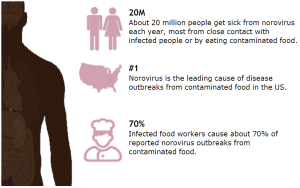Norovirus often gets attention for outbreaks on cruise ships, but those account for only about 1% of all reported norovirus outbreaks. Norovirus is very contagious, and outbreaks can occur anywhere people gather or food is served. People with norovirus usually vomit and have diarrhea.
Some may need to be hospitalized and can even die. Infected people can spread norovirus to others through close contact or by contaminating food and surfaces. Food service workers who have norovirus can contaminate food and make many people sick. In norovirus outbreaks for which investigators reported the source of contamination, 70% are caused by infected food workers.
The food service industry can help prevent norovirus outbreaks by:
- Making sure that food service workers practice proper hand washing and avoid touching ready-to-eat foods, such as raw fruits and vegetables, with their bare hands before serving them.
- Certifying kitchen managers and training food service workers in food safety practices.
- Requiring sick food workers to stay home, and considering use of paid sick leave and on-call staffing, to support compliance.
There is no specific medication to treat norovirus, but infected people should drink plenty of liquids to replace fluid lost through vomiting and diarrhea. Dehydration can occur rapidly and may require medical treatment or hospitalization.
The best course of action is prevention. The use of soap-and-water hand washing during and after such illness followed by the use of an alcohol hand gel is highly encouraged. First responders who become ill should not come back to work until symptom-free.
See the factsheet of CDC VitalSigns for more information.
